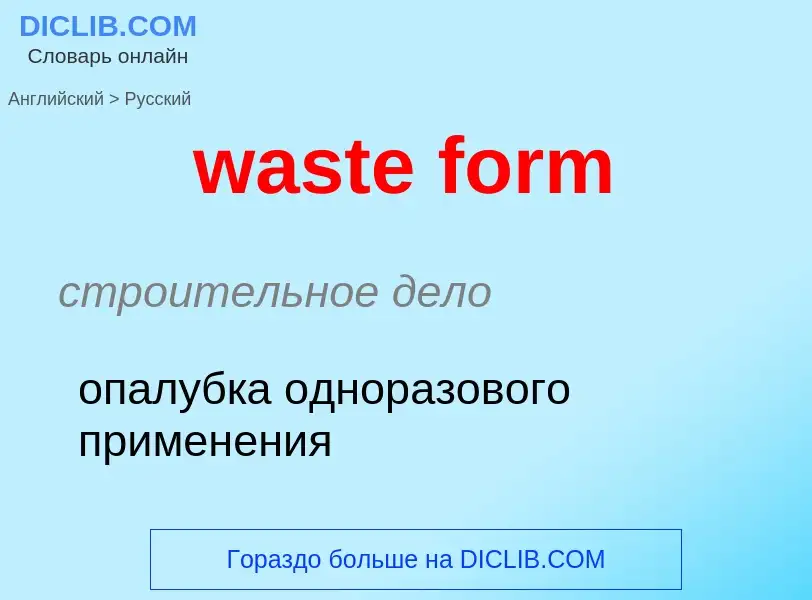Μετάφραση και ανάλυση λέξεων από την τεχνητή νοημοσύνη ChatGPT
Σε αυτήν τη σελίδα μπορείτε να λάβετε μια λεπτομερή ανάλυση μιας λέξης ή μιας φράσης, η οποία δημιουργήθηκε χρησιμοποιώντας το ChatGPT, την καλύτερη τεχνολογία τεχνητής νοημοσύνης μέχρι σήμερα:
- πώς χρησιμοποιείται η λέξη
- συχνότητα χρήσης
- χρησιμοποιείται πιο συχνά στον προφορικό ή γραπτό λόγο
- επιλογές μετάφρασης λέξεων
- παραδείγματα χρήσης (πολλές φράσεις με μετάφραση)
- ετυμολογία
waste form - translation to ρωσικά
строительное дело
опалубка одноразового применения
Ορισμός
)
Βικιπαίδεια
Waste minimisation is a set of processes and practices intended to reduce the amount of waste produced. By reducing or eliminating the generation of harmful and persistent wastes, waste minimisation supports efforts to promote a more sustainable society. Waste minimisation involves redesigning products and processes and/or changing societal patterns of consumption and production.
The most environmentally resourceful, economically efficient, and cost effective way to manage waste often is to not have to address the problem in the first place. Managers see waste minimisation as a primary focus for most waste management strategies. Proper waste treatment and disposal can require a significant amount of time and resources; therefore, the benefits of waste minimisation can be considerable if carried out in an effective, safe and sustainable manner.
Traditional waste management focuses on processing waste after it is created, concentrating on re-use, recycling, and waste-to-energy conversion. Waste minimisation involves efforts to avoid creating the waste during manufacturing. To effectively implement waste minimisation the manager requires knowledge of the production process, cradle-to-grave analysis (the tracking of materials from their extraction to their return to earth) and details of the composition of the waste.
The main sources of waste vary from country to country. In the UK, most waste comes from the construction and demolition of buildings, followed by mining and quarrying, industry and commerce. Household waste constitutes a relatively small proportion of all waste. Industrial waste is often tied to requirements in the supply chain. For example, a company handling a product may insist that it should be shipped using particular packing because it fits downstream needs.


.jpg?width=200)
.jpg?width=200)
![The [[Valley of the Drums]], a toxic waste dump in northern Bullitt County, Kentucky The [[Valley of the Drums]], a toxic waste dump in northern Bullitt County, Kentucky](https://commons.wikimedia.org/wiki/Special:FilePath/Valleyofdrums.jpg?width=200)
